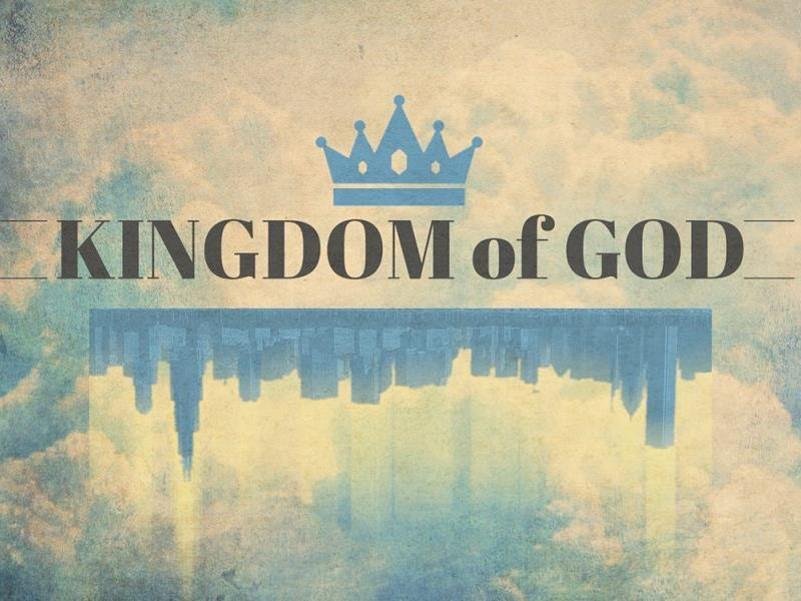Near the Kingdom
28 And one of the scribes came up and heard them disputing with one another, and seeing that he answered them well, asked him, “Which commandment is the most important of all?” 29 Jesus answered, “The most important is, ‘Hear, O Israel: The Lord our God, the Lord is one. 30 And you shall love the Lord your God with all your heart and with all your soul and with all your mind and with all your strength.’ 31 The second is this: ‘You shall love your neighbor as yourself.’ There is no other commandment greater than these.” 32 And the scribe said to him, “You are right, Teacher. You have truly said that he is one, and there is no other besides him. 33 And to love him with all the heart and with all the understanding and with all the strength, and to love one's neighbor as oneself, is much more than all whole burnt offerings and sacrifices.” 34 And when Jesus saw that he answered wisely, he said to him, “You are not far from the kingdom of God.” And after that no one dared to ask him any more questions." (Mark 12:28-34)
Jesus’s first statement in the Book of Mark is, “The time is fulfilled, and the kingdom of God is at hand; repent and believe in the gospel.” Mark 1:14. Jesus discusses the Kingdom numerous times throughout Mark. (See Mark 4:11, 26, 30; Mark 9:1; Mark 10:14-15; 23-25; and Mark 14:25.) What is interesting is that, as much as Jesus mentions the Kingdom, He never really directly describes about what He is talking. What is this Kingdom of God? Is the time truly fulfilled and is the Kingdom really, at hand? What does that even mean? Speaking for myself, so often when I look around the world, I sure don’t see God’s Kingdom.
Let’s consider the story of the wise scribe, set forth above, because it might provide the best clue regarding what Jesus had in mind. The prior day, Jesus had cleansed the Temple, saying, “‘My house shall be called a house of prayer for all the nations.’ But you have made it a den of robbers.” Mark 11:17. One can assume that, as a result of Jesus’s actions, the normally scheduled ritual sacrifices had ceased for that day. The following day, Jesus faced numerous challenges from Pharisees, scribes, Sadducees and Herodians, and it is in this context that He encounters the wise scribe. Jesus recites the great commandments, to love God and your neighbor as yourself, to which the wise scribe replies that those commandments are “much more than all whole burnt offerings and sacrifices.” (Mark 12:32-33). So, it is not the form of religion that counts, but the substance that matters; that love for God and your neighbor indwells within your heart. As majestic as the Temple was, even as a location for God’s presence on earth, more important is that which exists within you. Being near the Kingdom is not going to a place and participating in the form of religion, but opening yourself to loving God and your neighbor. That experience can happen anywhere; it can happen right now.
There’s a story in the following chapter of Mark that further embodies this concept. After watching wealthy people donate large monetary sums to the Temple treasury, Jesus and the disciples witness a poor widow offering two small copper coins. To this, Jesus says, “Truly, I say to you, this poor widow has put in more than all those who are contributing to the offering box. For they all contributed out of their abundance, but she out of her poverty has put in everything she had, all she had to live on.” Mark 12:43-44. Again, it’s the substance, not the form. It’s what was in that widow’s heart, not the amount. It’s the fact that she was willing to offer all she had; that she was willing to break her alabaster jar.
There’s another clue to Jesus’s concept of the Kingdom found in the Lord’s Prayer: “Thy Kingdom come, Thy will be done, on earth as it is in Heaven.” Matthew 6:10. By Jesus’s own words, what is the coming of the Kingdom? It is the will of God being manifested on earth. And what examples does Jesus give us for such will? “For even the Son of Man came not to be served but to serve, and to give his life as a ransom for many.” Mark 10:45. Then, following Christ’s example, Jesus issues the unsettling challenge to us all: “If anyone would come after me, let him deny himself and take up his cross and follow me.” Mark 8:34. Consider the two commandments Jesus discussed with the wise scribe. God’s will is that we love Him; that we deny the false idols of this world, which we, in practice, so often place over Him. God’s will is that we love our neighbors as ourselves. Who is our neighbor? Everyone. We are called to love others even when, in practice, they don’t deserve such regard.
Jesus inaugurated a Kingdom, but not the type anyone expected. Jesus came not to anoint leaders, but to change the very concept of leadership itself. Under the Christ model, leadership is an act of service to others, and we are all called to take up our cross. He came not to be served, but to serve; not to defeat Ceasar, but to defeat sin. His mission was not to conquer territory through violence, but each individual human heart through love. And how could any truly fundamental lasting change be otherwise? What kingdom could truly be called the “Kingdom of God” if sin had not been defeated? Sin is the source of all evil and corruption in the world. Man alone, through politics or economics, lacks the capacity to solve humanity’s ills so long as sin reigns.
To those who say, “Wait a second; God’s Kingdom won’t come until Jesus returns,” I say, “Amen, brother! Jesus, quickly come!” But I also rely on Jesus’s own words: “The time is fulfilled, the Kingdom of God is at hand.” Those words have to mean something. Jesus isn’t speaking in the future tense. He is talking about now, this moment: Something in the world has fundamentally changed by His presence.
By orienting yourself, your heart and your life towards the Kingdom, you can, now, today, see glimpses of the Kingdom; miracles of love. Let me suggest that, perhaps, there is another dimension to Jesus’s ministry: Possibly, not only is He talking about how you can get to Heaven, but how glimpses of Heaven can be seen on earth.
In Christ,
Mort Taylor


